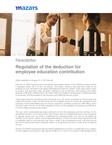
Regulation of the deduction for employee education contribution
Last July 14, 2020, the Government issued the long-awaited Decree 1013 of 2020 by means of which it regulated article 107-2 of the Tax Statute. This article mentions that payments made by the employer to care, stimulation and integral development centers for children under seven years of age, to primary and secondary basic education institutions and to technical, technological and higher education institutions, whether these are made under the modality of study grants or credits forgivable to the worker, will be accepted for tax purposes, provided that they are proven.
These disbursements, according to the mentioned norm, will not be considered as indirect payments made to the worker, reason for which they will not constitute income for income tax purposes and for purposes of their deductibility they will not be required to constitute a basis for withholding at the source for labor income nor will they integrate the basis for the liquidation of parafiscal contributions or to the integral social security system.
This rule, which undoubtedly generates welfare for all (for the employees and their families, for the educational centers, for the community) had not been able to be applied because it was necessary to regulate issues such as: What is understood by employee/worker, who can be considered as members of the family nucleus of the employee/employer, what are the terms and requirements that a forgivable credit or a scholarship must have in order to be considered as such, and what are the terms and requirements that a forgivable credit or a scholarship must have in order to be considered as such.
Decree 1013/2020 emphasizes that the benefit established in the law is conditioned to four factors: (i) that it applies to all workers under equal conditions (i.e., that it is not used to make desalarization schemes for certain executives but that it can be accessed by all employees); (ii) that the payments are made to formal education institutions approved by the Government (it does not apply to alternative or informal education courses); iii) that the payment is made directly by the employer to the educational institution (i.e., that there are no direct disbursements made to the employee); iv) that the value of the scholarship and/or forgivable credit only includes tuition, board, textbooks and software necessary for the study; v) that there are no clauses or conditions of minimum permanence of the employee in the company, nor that the employee may be required to reimburse such amounts.
The Decree regulates everything related to the investments that are admissible in programs and centers for stimulation and integral development and/or initial education, as well as the contributions to primary and secondary basic education institutions recognized by the Colombian Ministry of National Education. Likewise, it contains -as control mechanisms- the obligations that must be accredited by those who make use of this benefit.
These obligations include sending to the DIAN, as exogenous information, the information required herein, the making of all payments through the financial system, the accreditation that the company is in good standing, the accreditation that the company is in good standing with the DIAN, and the payment of all taxes.
that the company is up to date with the social security payments of its employees, and to have an annual certification from the company's statutory auditor, where the basic data of the participation in this program is accredited.
The regulation established herein allows employers to make use of this deduction mechanism for contributions to the education of employees, which will bring many benefits for them, their families, the educational entities in the area of influence of the company and the community in general.


